A crypto wallet is essential for storing your digital assets safely.
It comes in different forms, such as Software wallets, Hardware walletsand Cold storage.
They are intended to protect your private keys, although some types of wallets offer stronger protection than others.
Biometric security It is a feature implemented in hardware wallets that relies on human physical traits to verify identity.
This guide will explore Biometric crypto walletsexplaining how they work, and which ones are best for cryptocurrency investments.
List of contents
What is a biometric wallet?
A biometric wallet is a cryptocurrency wallet that uses biometric authentication.
This is usually a fingerprint or facial recognition, but can also be an iris scan.
Biometrics technology is used in many different situations as a security and protection tool. It makes it almost impossible for anyone but you to access your crypto wallet.
Typical cryptocurrency wallets rely on PINs or passwords to grant access.
Although these are good security measures, they are hackable, while biometrics are unique to you and you only!
In contrast, traditional wallets rely on user discipline for protection. For example, if you forget your password or fall victim to a phishing scam, your funds could be at risk.
But, with A Biometric crypto walletYou can add an extra layer of protection.
How does biometric authentication work in a cryptocurrency wallet?
Biometric cryptocurrency wallets work in a fairly straightforward way:
1️⃣Recording biometric data
When you set up a biometric crypto wallet, it either scans your fingerprint, face, or other biometric features. For example, a fingerprint scanner registers the unique edge patterns on your finger.
2️⃣Storing your encrypted biometric data
Instead of saving your actual fingerprint or facial data, a biometric crypto wallet converts your information into an encrypted template. This template is usually stored on the device, but depending on the system it can be sent to an online storage facility.
3️⃣Live data matching
When you try to access your crypto wallet, the device scans your biometric data again and compares it to the stored template. If they match, you can access. The process is usually very fast and only takes seconds to confirm or reject.
The most common form of biometric identification?
Fingerprint scanners are the most common type of biometric authentication.
These scanners analyze your unique fingerprint to create a unique map.
It’s incredibly accurate, though False acceptance rates (FAR) as low as 0.001%.
What are the best biometric wallets for your cryptocurrency?
Biometric cryptocurrency wallets are becoming more popular, with some existing wallets adopting this feature into their existing security systems.
Here are our top 3 picks for the best hardware biometric crypto wallets on the market:
Dicent wallet
The D’Cent Wallet features a compact design. A fingerprint scanner has been integrated directly onto the device’s screen. This makes it fast and easy to use.
🛡️Security features: Encrypted fingerprint storage and secure chip technology to protect against unauthorized use.
👍Job: User-friendly interface with accompanying mobile app.
🪙Encryption compatibility: Supports more than 3,000 cryptocurrencies, including Bitcoin, Ethereum, and XRP.
🔃Recovery options: Provides a recovery seed phrase, which must be stored separately for safekeeping.
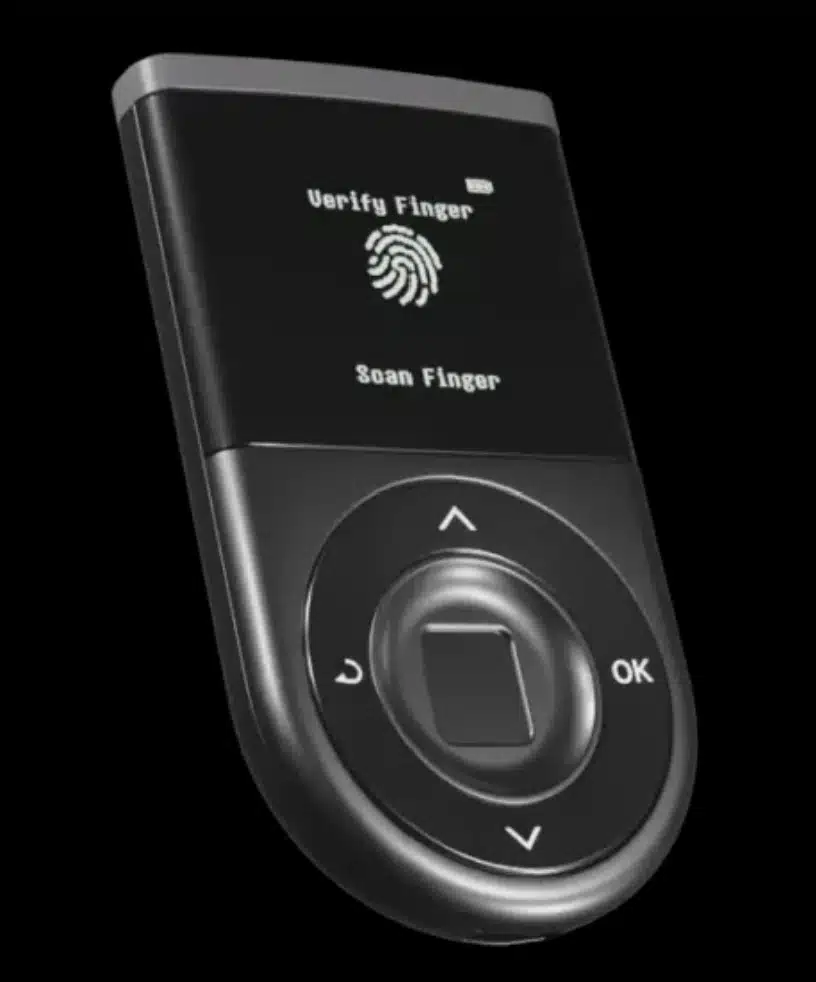
Did you know?
The D’Cent Wallet was one of the first biometric wallets to hit the market.
SecuX: Shield Bio
Shield Bio by SecuX combines the best security features of a hardware wallet with biometric security.
🛡️Security features: Military-grade secure chip and encrypted storage of your vital data.
👍Job: The large touch screen makes navigating the wallet easy.
🪙Encryption compatibility: Supports more than 1,000 cryptocurrencies, including ERC-20 tokens.
🔃Recovery options: Provides multiple recovery methods, including seed phrases, QR codes, and fingerprint data.
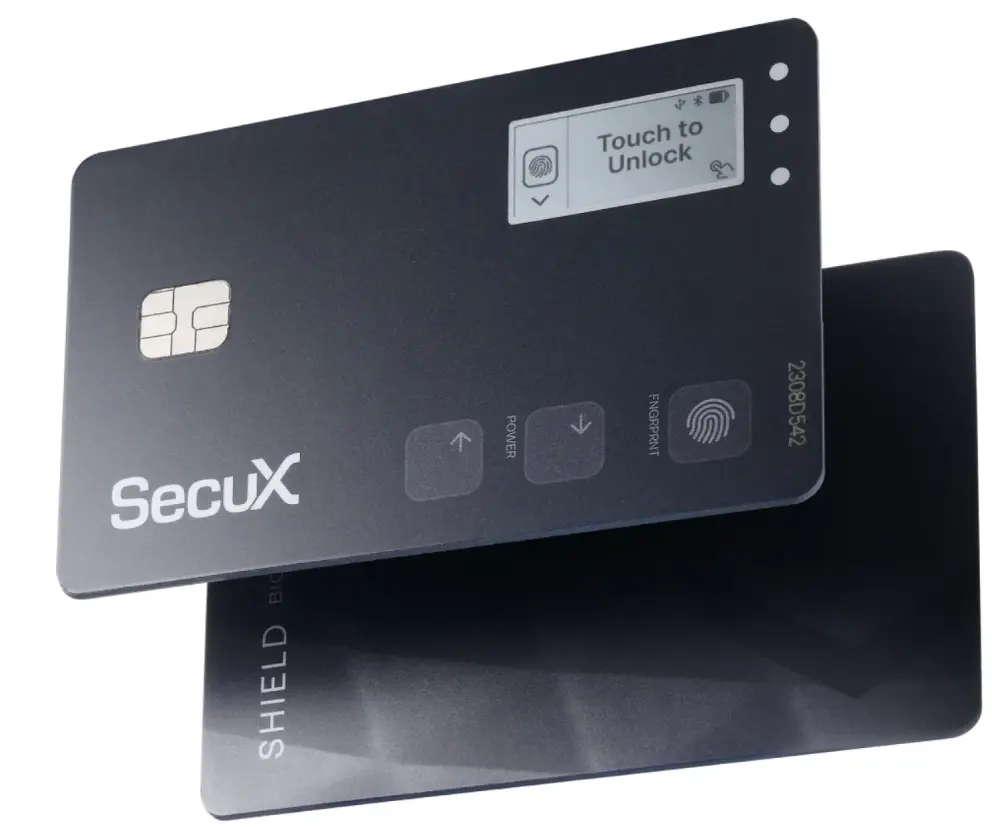
Tangim wallet
Tangem takes a different approach to hardware storage, as it is a card-based biometric wallet. You can authenticate by opening the wallet using your smartphone’s biometric features, such as your fingerprint or Face ID.
🛡️Security features: Biometric authentication through a secure app and tamper-resistant NFC-enabled cards.
👍Job: Very portable, requires no batteries or charging.
🪙Encryption compatibility: Supports multiple cryptocurrencies, including Bitcoin, Ethereum, and Litecoin.
🔃Recovery options: You can manage multiple backup cards for recovery.
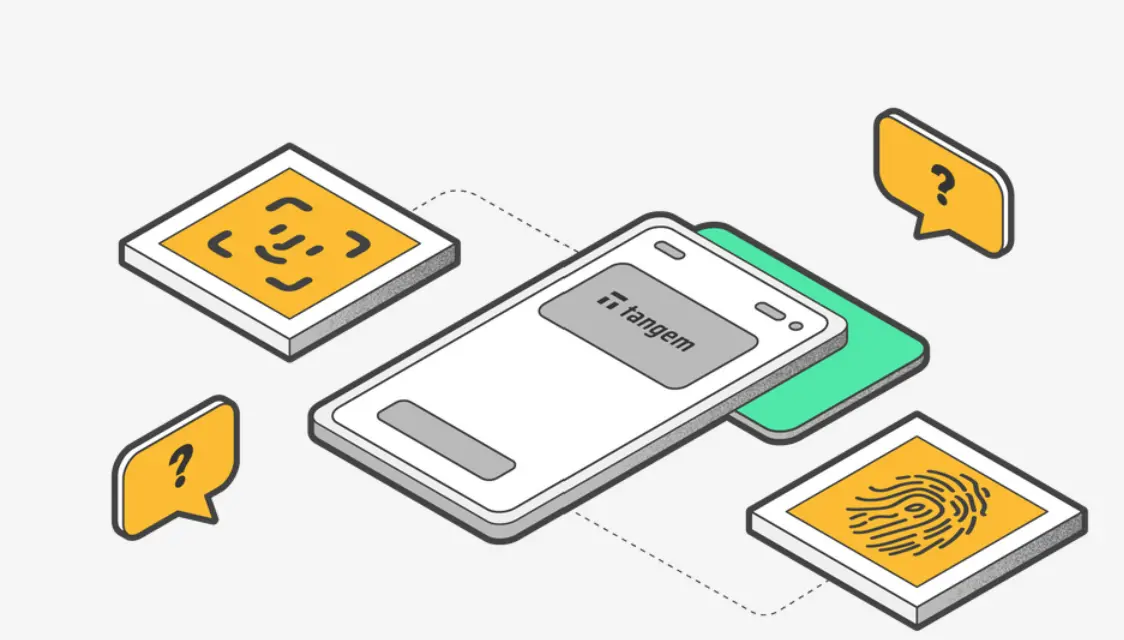
How to set up and use a biometric crypto wallet safely
Setting up a biometric wallet is simple, but it’s important to do so securely. Here’s a step-by-step guide:
1. Purchase and validate the wallet
- Always buy your crypto wallet from the official website.
2. Install necessary software/applications
- Download the official app or software that is paired with your wallet if possible.
3. Recording biometric data
- During setup, you’ll be asked to follow instructions to register your fingerprint or other biometric data.
4. Backup recovery statements
- You will also be given a recovery phrase generated during the initial setup. This phrase usually consists of 12 to 24 words and should be stored securely on a cold wallet backup.
Is biometric security safe?
Biometric security It provides convenience and adds an extra layer of protection to cryptocurrency wallets.
But it also comes with Risks.
Unlike passwords, biometric data cannot be changed if it is compromised. If hackers steal this data, they can exploit it across multiple systems, using your biometric information without your consent.
Privacy is another big concern to consider when giving up your biometric data. Biometric information that is Incorrectly stored Or sharing it without consent can lead to identity theft.
Although many advanced biometric crypto wallets use anti-spoofing protection, it is still possible to fool some systems with fake fingerprints or 3D printed faces.
Finally, legal protection for biometric data also varies by country and region.
A safer alternative to a biometric crypto wallet
If you are looking for maximum security without the risks associated with biometric data, use an air-gap wallet, e.g Physical shadow coupled with DIY materials Seed statement backup is an ideal solution.
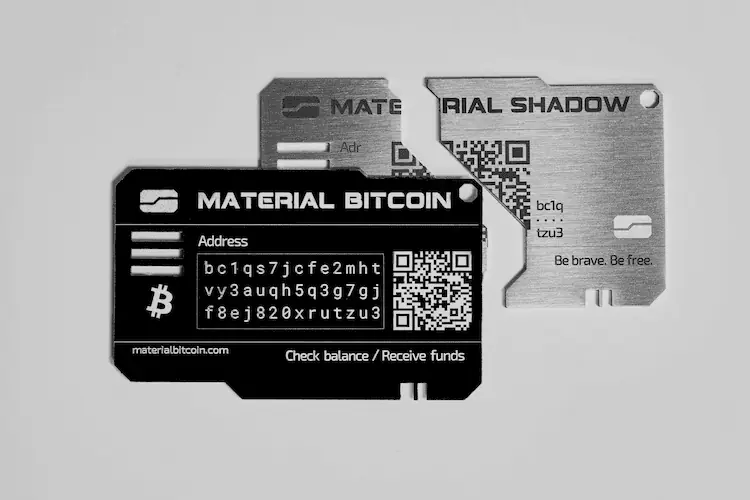
This is correct Cold storage wallets That prioritizes your privacy and data security by eliminating the use of electronic components, third-party applications, or biometric authentication.
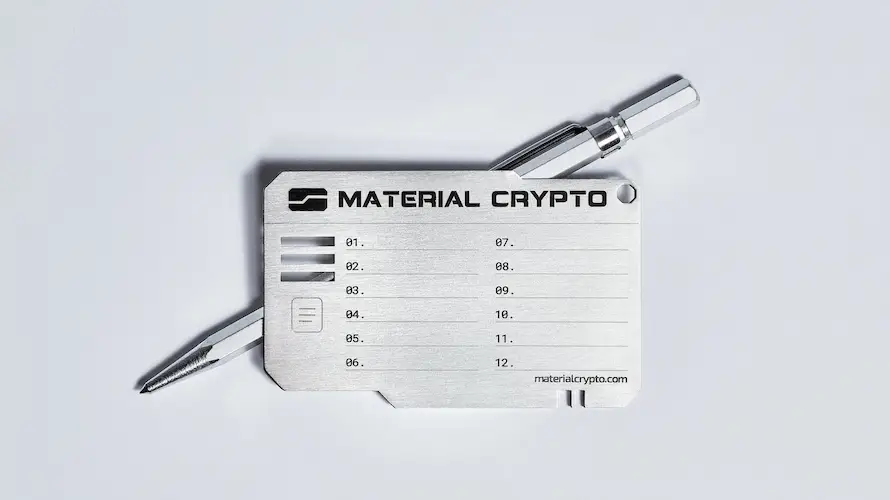
Why this combo is the best cold storage solution
Together, the Material Shadow and Material DIY wallet provide maximum security for your crypto assets.
Complete privacy: No biometric data or personal information is needed at all.
Maximum security: Funds are protected from cyber and physical threats.
Complete control: You have 100% control over your keys and recovery phrases, eliminating the need for third-party platforms.
The right balance for your crypto security
Biometric wallets have a strong security feature in protecting your cryptocurrencies and are a great option for users who want quick access to their devices.
But keep in mind that every user has different priorities when it comes to storing their cryptocurrencies. It’s best to review your needs and decide if you prefer ease of use, advanced security, compatibility with other cryptocurrencies, or anonymity.
Determining your needs will help you find the best hardware wallet for you.
Frequently asked questions
How secure are biometric wallets compared to traditional wallets?
- Biometric wallets reduce unauthorized transactions, providing strong protection.
What happens if I lose my biometric wallet?
- You can recover your money using the backup seed phrase or recovery key provided during setup.
Can I get a refund if the biometric wallet doesn’t recognize my fingerprint?
- Yes, most wallets have alternative recovery methods, such as PINs or seed phrases.
Are there physical wallets with biometric authentication?
- Yes, there are hardware wallets with biometric verification.
What are the best biometric wallets for cryptocurrencies?
- Top options include D’Cent Wallet, SecuX Shield Bio, and Tangem Wallet, each with their own unique features.
What are untraceable crypto wallets?
- Privacy-focused wallets like Material Shadow prioritize anonymity.



